Wildlife Violations
Attorney Stancil Wins Reinstatement of Client’s Hunting/Fishing Rights
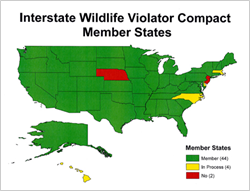

In December of 2014, Wildlife Attorney Julia Stancil went before the Colorado Wildlife Commission to petition for a reinstatement of her client’s rights to hunt and fish in Colorado and all other states within the Interstate Wildlife Compact. Her client had received a decades-long suspension of hunting and fishing privileges after accumulating a series of tickets as a youth. The time limit to appeal such a suspension is thirty (30) days following an administrative decision, but unfortunately, the client had not retained legal counsel at the time and did not appeal. Without the right to appeal the decision, Ms. Stancil filed a Petition for Declaratory Order. This is essentially a petition for equitable relief that was based upon an argument that the client should not have received such a lengthy suspension based upon the statutes violated at the time. This unique argument prevailed and Ms. Stancil’s client immediately had their rights reinstated.
If you have been given a notice of a hearing by the Division of Wildlife, contact the experienced Wildlife Attorneys at Welsh Law, LLC. One of our attorneys can advise you, argue the case at the hearing level to attempt to prevent or mitigate a suspension, and can also appeal a decision that is made by the hearings examiner.
The Legalities of “Walkie Talkie” Use While Hunting
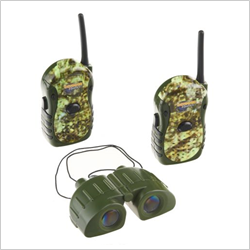

Several clients have asked about the legality of "walkie-talkie" use or use of other electronic devices while hunting. For example, an elk hunter asked me if he would be violating Colorado’s wildlife laws if he and his son used "walkie-talkie’s" to communicate their locations while hunting on opposite sides of a creek. Of course, the hunter’s concern was safety while hunting and my answer was that this would not be an illegal use of an electronic device.
The statute he was referring to was C.R.S. 33-6-124(3), which states as follows: "it is unlawful for two or more people on the ground, in a motor vehicle, or in a vessel to use electronic devices to communicate information in the furtherance of a violation of Articles 1 to 6 of this title or of a commission rule. A person who violates this subsection (3) is guilty of a misdemeanor, and upon conviction thereof, shall be punished by a fine of two hundred dollars and an assessment of 15 license suspension points." Of note, if a person accumulates 20 suspension points over a period of five consecutive years, the commission may suspend their license to hunt and fish for up to five years.
It would not be illegal for hunters to use "walkie-talkies" to communicate their locations. It is not illegal for an individual to advise another that "there is a herd of elk coming your way." While not illegal to advise on the locations of animals per se, some people feel this conduct is not ethical for a hunter under the principles of fair chase and fair play. An example of something unlawful would be to advise another "there is a herd of elk coming your way – shoot one for me!." Another example of unlawful use of walkie-talkies would be if a hunter shoots an elk over bait and then uses a walkie-talkie to communicate his location to his hunting partner for assistance in field dressing the animal. In this example, but the hunter who shot the elk over bait, and the hunter who assisted in field dressing would be in violation of various statutes.
As always, hunters should review the current laws on a yearly basis as these laws change. If you have been cited for a violation of any wildlife law, or have a question on the laws, please contact an experienced attorney from Wildlife Lawyers.
Elephant Ivory Case Moving Forward
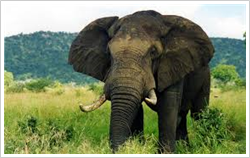

Hunters going on exotic hunting safaris will be interested to know when they may once again hunt certain countries in Africa for elephants. Currently, the Safari Club International, as well as the National Rifle Association, have filed suit against the Department of Interior regarding their suspension of the importation of elephant trophies of sport-hunted elephants from Tanzania and Zimbabwe in 2014.
In a memorandum opinion issued last month, the United States District Court, District of Columbia granted the Department’s motion to dismiss the Tanzania claims but denied the motion to dismiss the Zimbabwe claims. Still, the plaintiffs have been allowed time to refile an amended complaint.
The road ahead is a long one, but these organizations have chosen to fight the battle for hunters looking to hunt elephants in Africa and import the ivory trophy back to the United States legally. Even in the countries where harvested animals may be exported to the US legally, several rules and regulations from treaties and statutes apply and the hunter must be careful to abide by those guidelines. An attorney at Wildlife Lawyers can help to ensure your exotic trophy is not confiscated or destroyed. If you are planning an African or other exotic safari hunt and want an experienced attorney to assist with the permitting process, call Wildlife Lawyers.
Colorado Big Game Winding Down, Waterfowl Ramping Up
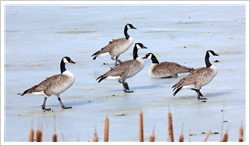

With most big game seasons ending, the waterfowl season in Colorado is ramping up for January. Rifle Plains Deer season will go through January, but most of the deer, elk, and pronghorn seasons have come and gone. Many big game hunters will turn instead to dark geese, ducks, and eventually snow geese.
Colorado hosts a large number of capable outfitters for those hunters who don’t feel like messing with a large decoy spread and finding a spot to hunt away from the public crowds. For a modest fee, outdoorsmen and women can sit in comfortable blinds and focus on camaraderie and socializing and let their guide worry about decoys and calling.
Public ground in Colorado can be at a premium in January when most of the lakes have frozen. The few public areas with open water on rivers or sloughs will see a lot of foot traffic from Colorado duck and goose hunters. Public land hunters will benefit from extensive scouting and long hikes with their gear.
As with any hunting season, it’s important to know what you and your hunting companions are required to carry. Colorado Parks and Wildlife Officers will be checking waterfowl hunters for proper licenses and equipment through the end of the season. If you receive a ticket, it is vital to talk to a Wildlife Lawyer to learn your options. One of our experts in our Wildlife Law group will walk you through the options you have — we are here to help you.
Kansas Rifle Deer Season Winds Down
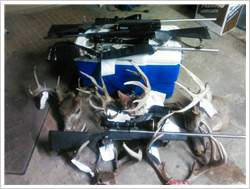

With Rifle deer season winding down this past weekend, wardens were very busy in Kansas. Several hunters from both in and out of state were charged with violations ranging from criminal trespass to aggravated assault to no hunting license.
Hunting violations are very serious and can affect every aspect of your life. At Wildlife Lawyers, we have a dedicated team of attorneys to assist you with the judicial process. We’ll be there every step of the way making sure your voice is heard and your rights are preserved.
If you received a Kansas Deer Hunting Violation this year, call one of our Wildlife Lawyers today and talk with them about your options. We specialize in representing hunters, and our attorneys licensed in various states, including Kansas, will be your best ally in the process.
Hunter Loses Elk After Reality TV Star Officer Issues Violation for the Cameras
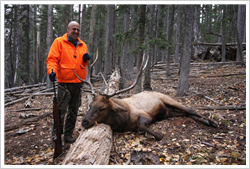


A Minnesota hunter enjoying the elk season in Montana was issued a citation this season for "failure to properly tag" the elk he killed. According to reports, Jim Latvala harvested a beautiful bull elk in the early hours of the morning at first light. He and his brother then had to wade through a swamp to reach the animal. Upon reaching their bull, the pair were elated and took a moment to survey the area, appreciate the animal, and let the joy of a successful hunt wash over them.
Then the Reality TV Cameras came. A Montana Fish and Wildlife Officer, Drew Scott, approached the pair while being followed by TV Cameras for the show "Wardens." According to him, because the hunters had taken "20 minutes" before tagging the bull, he not only had to issue the shooter a citation but also confiscate the entire bull, antlers, and all.
According to Joe Knarr, the Warden Sergeant for the area the incident occurred in, "If you read the statute, it says you must immediately validate the tag." No time for joy or elation here. No high fives, handshakes, or pats on the back. No allowing for a quiet moment with the animal out of respect for him and the tradition of hunting. Apparently, the best kind of hunter in Montana is a bureaucrat who approaches with folders of paperwork and no feelings whatsoever.
If you are ever issued a citation while hunting, whether for a hunting-related crime or not, it is imperative that you retain counsel to help you through the judicial process. Citations like the one issued here should be taken very seriously and defended with the utmost effort. An attorney at Wildlife Lawyers can help answer your questions and counsel you about any violations you may have received.
Kansas Big Game Violations
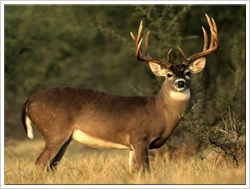

Rifle deer season is more popular than ever in Kansas, with the season getting underway this week. Hunters can expect to see several others in pursuit of deer this weekend and should be mindful of the laws applying to white-tailed and mule deer in Kansas.
If you receive a ticket while deer hunting in Kansas, hunters should know that a conviction or guilty plea to their first violation in Kansas could lead to fines between $500-$1,000 or six months in the county jail. In addition, if the animal harvested is a trophy, special fines apply. A white-tailed deer with an inside spread measurement of greater than 16 inches or a mule deer with an inside spread of greater than 20 inches, will earn the violator an additional $5,000 fine. (Kan. Stat. Ann. § 32-1032).
Depending on the size of the deer taken, restitution may be ordered paid to the State for the value of the deer. Based on a formula derived from the size of the antlered animal, the hunter could be facing even more additional fines.
Finally, even your first guilty plea or conviction of a hunting violation in Kansas can lead to a one-year suspension of all hunting privileges. Hunters facing their second or third can lose their privileges for up to 5 years.
If you are accused of illegally hunting deer in Kansas, it is vital that you contact a Wildlife Lawyer to represent you. You have rights when it comes to the judicial process and a Wildlife Lawyer licensed in Kansas can help you. A qualified attorney with our office will be on your side and fight for your best interests, as neither the judge, prosecutor, or game warden can do so. Before paying any fines or taking any plea offers, consult with one of our Wildlife Lawyers.
Wildlife Laws Different, But Same Across States



As the holidays come and go, many outdoorsmen will travel with their families and friends to hunt in neighboring states. This presents the hunter with a whole new world of opportunity and risk.
For instance, a Kansas hunter who is used to setting out a bag of corn in order to hunt the deer that come to feed over it will find himself in trouble in both neighboring states of Colorado and Missouri. Colorado, for instance, only allows the use of bait for the taking of furbearers while Kansas allows the use of bait in the pursuit of deer and turkey.
In Missouri, many counties, including those sharing a border with Kansas, have in place "antler restrictions". These restrictions prohibit hunters from harvesting buck whitetail deer with less than four antler points on at least one side. This restriction is the topic of hot debate among big game hunters in Missouri who doubt its effectiveness at producing the large trophy animals as it was intended to do. Deer is illegal under this provision in Missouri, but would be legal just across the county line in Kansas or Nebraska.
Even waterfowl hunting differs from state to state, while being heavily influenced by the federal guidelines. Duck limits differ from state to state, depending on the usual available species and their abundance. Colorado has a daily limit of 5 Canada Geese per hunter and Kansas has a daily limit of 6 per hunter. Even shooting time can be different, with Kansas teal season shooting time being half-hour before sunrise and Missouri’s teal season shooting time being at precisely sunrise.
In short, if you travel to hunt, make sure you research thoroughly the laws of the state you’re traveling to. Even a small violation could ruin an otherwise phenomenal hunting experience. If you’re accused of a hunting violation or receive a hunting ticket, let a Wildlife Lawyer help you keep your voice and give you your day in court. You have rights and a Wildlife Lawyer can help protect them.
Size Matters
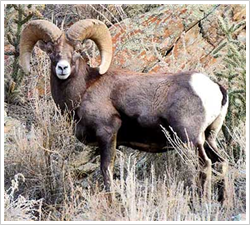

In 1995, two individuals stalked a trophy bull elk in Estes Park, Colorado, and illegally killed him and three other elk. That one elk was affectionately referred to as Samson by Estes Park residents and his death had a profound impact not only on them, but Colorado wildlife laws.
Referred to as "Samson’s Law", a regulation was enacted placing heavy fines on hunters accused of illegally hunting, taking, or possessing big game in Colorado assigning an additional surcharge. Under this law, fines are as follows: for each bull elk with at least six points on one antler beam, $10,000, for each mule deer buck with an inside antler spread of at least twenty-two inches, $10,000, for each whitetail deer buck with an inside antler spread of at least eighteen inches, $10,000, for each bull moose, $10,000, for each bighorn sheep with a horn length of at least one-half curl, $25,000, for each mountain goat, $10,000, for each pronghorn antelope with a horn length of at least fourteen inches, $4,000.
Effectively, Samson’s Law places stiffer penalties on those who illegally hunt trophies in the state. For some, who find themselves with the harvest of a lifetime and innocently made a small mistake, these penalties can seem stiff.
If you find yourself facing a fine under Samson’s Law, consult with a Wildlife Lawyer before making any decisions. Our attorneys know that mistakes can happen and will help guide you through the legal process.
Non-Hunting Crimes Lead to Hunting Suspension


In Colorado generally, hunting-related offenses earn the offender "points" on his license. Handed down in 5 point increments (each offense being worth a separate number of points depending on severity), when the total points accumulated in a 5 year period reaches 20, a hearing is conducted to determine the length (if any) of suspension of that individual’s hunting or fishing privileges.
However, any other crimes committed while in the act of hunting or fishing can lead to a hearing as well. Crimes such as littering, assault, animal cruelty, etc. can all lead to a suspension hearing by the Department of Wildlife. While these crimes do not have any point values associated with them, it is in the discretion of the State Hearing Examiner to look at the complete case file and determine if the crime should lead to a suspension of privileges.
As with any time you are accused of a crime, you should seek the advice of an attorney who knows and understands your situation and can help to preserve your rights and give you your voice in court. Speak with a Wildlife Lawyer at Welsh Law, LLC to find out how we can help you through the process.
